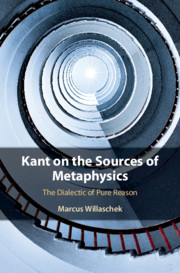Book contents
- Kant on the Sources of Metaphysics
- Kant on the Sources of Metaphysics
- Copyright page
- Dedication
- Contents
- Note on References and Citations
- Preface
- Introduction
- Part I From Reason to Metaphysics
- Introduction to Part I
- 1 Kant’s Conceptions of Reason and Metaphysics
- 2 The Logical Use of Reason and the Logical Maxim
- 3 The Supreme Principle of Pure Reason
- 4 Understanding the Transition Passage (A307–8/B364)
- 5 The Transition from the Logical Maxim to the Supreme Principle of Pure Reason
- Conclusion to Part I: The Transition from the Logical Maxim to the (Constitutive) Supreme Principle and the Rational Sources Account
- Part II The Other Side of the Transcendental Dialectic
- Postscript
- Bibliography
- Index of Names
- Index of Subjects
3 - The Supreme Principle of Pure Reason
from Part I - From Reason to Metaphysics
Published online by Cambridge University Press: 09 November 2018
- Kant on the Sources of Metaphysics
- Kant on the Sources of Metaphysics
- Copyright page
- Dedication
- Contents
- Note on References and Citations
- Preface
- Introduction
- Part I From Reason to Metaphysics
- Introduction to Part I
- 1 Kant’s Conceptions of Reason and Metaphysics
- 2 The Logical Use of Reason and the Logical Maxim
- 3 The Supreme Principle of Pure Reason
- 4 Understanding the Transition Passage (A307–8/B364)
- 5 The Transition from the Logical Maxim to the Supreme Principle of Pure Reason
- Conclusion to Part I: The Transition from the Logical Maxim to the (Constitutive) Supreme Principle and the Rational Sources Account
- Part II The Other Side of the Transcendental Dialectic
- Postscript
- Bibliography
- Index of Names
- Index of Subjects
Summary
Chapter 3 turns to the fundamental metaphysical concept in Kant, the concept of the ‘really’ (not just logically) unconditioned, and to the conditioning relations between objects that speculative metaphysics tracks. Kant’s Rational Sources Account (his argument that the sources of speculative metaphysics lie in reason itself) rests on the claim that the logical use of reason naturally leads us to accept a principle he calls the “supreme principle of pure reason.” In this chapter, we will try to clarify this principle by asking what Kant, in the context of the Supreme Principle, means by ‘given,’ by ‘the conditioned’ and its ‘conditions,’ what it means for something to be ‘unconditioned,’ and why Kant thinks the series of subordinated conditions is supposed to be unconditioned in this sense. Finally, we will ask how that principle relates to the Principle of Sufficient Reason.
Keywords
- Type
- Chapter
- Information
- Kant on the Sources of MetaphysicsThe Dialectic of Pure Reason, pp. 71 - 102Publisher: Cambridge University PressPrint publication year: 2018

